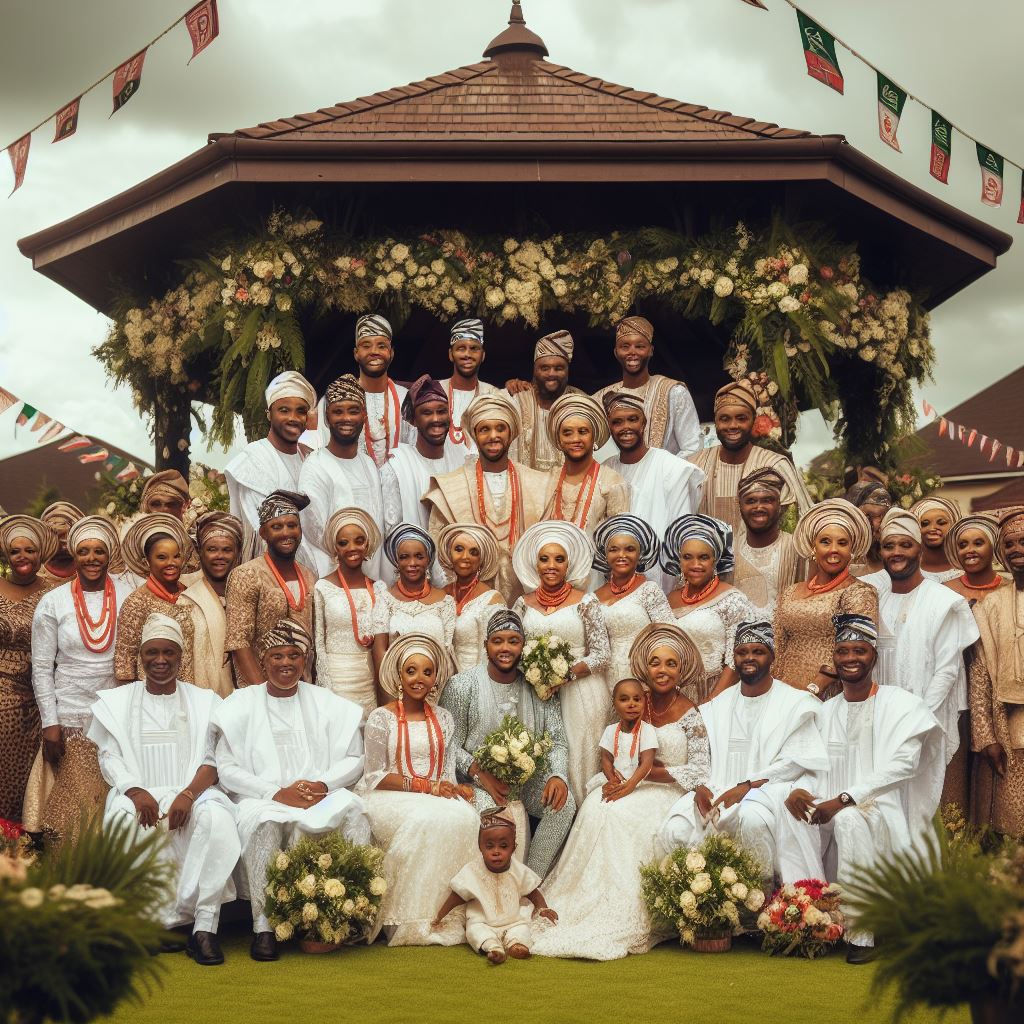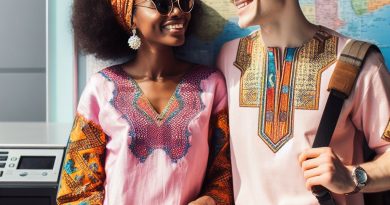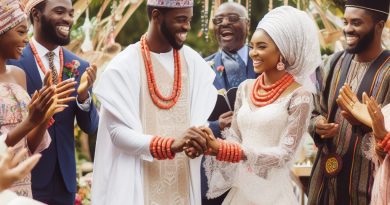Marriage Messages in Nigerian Literature: A Deep Dive
Last Updated on October 29, 2023
Introduction
Brief explanation of Nigerian literature
Nigerian literature encompasses the literary works produced within Nigeria or by Nigerian authors.
Nigerian literature is a diverse and rich literary tradition with roots in various ethnic groups and languages.
It encompasses a wide range of genres, including novels, poetry, and drama.
The Nigerian literary scene has produced renowned authors like Chinua Achebe, Wole Soyinka, and Chimamanda Ngozi Adichie, whose works have gained international recognition.
These writers explore themes such as post-colonialism, cultural identity, and social issues, offering unique perspectives on Nigeria’s complex history and contemporary society.
Nigerian literature has a global impact, contributing to discussions on African literature and the African diaspora, making it a vital component of world literature.
Importance of marriage messages in literature
Marriage messages play a significant role in Nigerian literature in addressing societal issues.
Marriage messages in literature play a pivotal role in shaping societal values and perceptions of relationships.
Authors convey profound insights into the complexities of matrimony, offering readers valuable lessons.
These messages promote empathy and understanding of diverse marital experiences.
Literature often emphasizes the significance of communication, trust, and compromise in sustaining a healthy marriage.
It showcases both the joys and challenges of wedlock, providing a mirror for readers to reflect on their own relationships.
By depicting various marriage scenarios, literature highlights the importance of making informed choices and nurturing love and commitment for lasting unions.
These messages continue to influence our views on marriage, contributing to its enduring relevance in contemporary society.
Thesis statement: “Marriage Messages in Nigerian Literature: A Deep Dive.”
Nigerian literature’s exploration of marriage messages reveals complex societal dynamics, presenting various perspectives on unions, challenges, and transformations.
Authors offer profound insights into marital relationships, often challenging traditional norms.
They delve into the intricacies of love, power, and cultural influences within these unions, shedding light on evolving gender roles and the impact of colonialism.
This deep dive into Nigerian literature elucidates the multidimensional nature of marriage, illuminating how it reflects broader social changes.
The narratives uncover tensions, struggles, and the resilience of characters as they navigate the institution of marriage, reflecting Nigeria’s intricate socio-cultural tapestry.
Ultimately, this literary exploration enhances our understanding of the Nigerian experience and contributes to the broader conversation on marriage’s role in society.
Traditional Marriage Messages
Overview of traditional marriage customs in Nigeria
- Marriage customs in Nigeria vary across different ethnic groups.
- Arranged marriages are common and families play a significant role.
- Bride price or dowry is often given by the groom’s family to the bride’s family.
- Marriage ceremonies involve various rituals, dances, and feasts.
Examination of marriage messages in oral folktales
- Oral folktales are rich sources of marriage messages in Nigerian culture.
- These tales often explore the importance of love, commitment, and family unity in marriage.
- They also teach valuable lessons about obeying elders and respecting cultural traditions.
Analysis of traditional marriage messages in literature
- Nigerian literature reflects the traditional marriage customs and values prevalent in the country.
- Many Nigerian literary works depict the complexities and challenges of marriage.
- These messages serve as a reflection of the society’s expectations and norms.
Examples from notable Nigerian literary works
- Chinua Achebe’s “Things Fall Apart” portrays Igbo marriage customs and their significance.
- Amos Tutuola’s “The Palm-Wine Drinkard” explores the consequences of breaking marriage taboos.
- Chimamanda Ngozi Adichie’s “Half of a Yellow Sun” delves into the effects of war on marital relationships.
Common themes and motifs
- Love and compatibility are often emphasized as essential foundations for a successful marriage.
- The importance of gender roles and societal expectations in marriages is frequently addressed.
- Marriages as alliances to maintain social status or unite families is another recurring theme.
- Challenges such as infidelity, domestic violence, and polygamy are also examined in Nigerian literature.
Marriage messages in Nigerian literature offer a profound insight into the country’s traditional customs and values. Arranged marriages are common, with families actively involved in matchmaking.
Bride prices or dowries are customary, strengthening family bonds. Marriage ceremonies are rich in cultural rituals, symbolizing the union of two families.
These customs, essential for understanding Nigerian marriage, are also conveyed through oral folktales.
These stories highlight love, commitment, and respecting traditions for a harmonious marriage.
Nigerian literature, classic and contemporary, reflects diverse facets of these values. Works like Chinua Achebe’s “Things Fall Apart” explore Igbo customs.
While Amos Tutuola’s “The Palm-Wine Drinkard” delves into taboo-breaking consequences.
Chimamanda Ngozi Adichie’s “Half of a Yellow Sun” examines the impact of war on marriages.
These narratives consistently emphasize love, adhering to roles and societal expectations, and the union of families.
They address challenges such as infidelity and domestic violence, illuminating marital complexities.
In essence, Nigerian literature serves as a mirror for societal expectations regarding marriage, offering valuable insights into the cultural fabric of Nigeria.
It is a source of profound knowledge, bridging tradition and modernity, in the context of marriage.
In essence, Nigerian literature sheds light on marriage customs, values, and challenges, offering insights into the country’s culture and societal expectations.
Read: Modern Vs. Traditional: Marriage Messages in Nigeria

Evolving Marriage Messages
Impact of colonization on marriage messages
- Colonization introduced new societal structures and values, altering traditional marriage messages in Nigeria.
- British influence emphasized monogamy and Christian values, shaping Nigerian marital practices.
- Colonial rule eroded polygamy as a cultural norm, challenging existing marriage messages in Nigerian literature.
Influence of Western ideologies on marriage in Nigeria
- Western ideologies perpetuated the concept of romantic love, altering traditional marriage messages.
- Western influence introduced the idea of gender equality, impacting marriage messages within Nigerian literature.
- Nigerian authors reflect Western ideals of companionate marriage, focusing on emotional connection and shared goals.
Exploration of changing marriage messages in contemporary Nigerian literature
- Contemporary Nigerian literature portrays love and companionship as essential components of successful marriages.
- Authors challenge patriarchal norms by depicting empowered women who resist traditional gender roles in marriage.
- Individuality and self-expression are emphasized as vital for a fulfilling marriage in modern Nigerian literature.
Representation of love and companionship
Contemporary Nigerian authors illustrate love and companionship as foundations for lasting marriages.
Characters prioritize emotional connection and mutual support over materialistic desires.
Examination of patriarchal norms
Nigerian literature reflects the evolving role of women in society, challenging patriarchal norms within marriages.
Female characters strive for autonomy and defy societal expectations.
Emphasis on individuality and self-expression
Modern Nigerian literature encourages individuals to express their true selves within the institution of marriage.
Authors portray couples who value personal growth and encourage self-discovery.
In fact, Nigerian literature depicts the evolving nature of marriage messages influenced by colonization, Western ideologies, and contemporary societal changes.
Love, companionship, gender equality, and individuality are focal points in portraying the concept of marriage in Nigerian literature.
Read: The Shift in Marriage Messages over Generations in Nigeria
Gender Roles and Marriage Messages
Discussion on traditional gender roles in Nigerian society
- Explore the traditional roles assigned to men and women in Nigerian society.
- Analyze the expectations placed on men and women in terms of marriage and family.
- Discuss the impact of these gender roles on the dynamics of Nigerian marriages.
Examination of marriage messages related to gender in literature
- Explore how Nigerian literature portrays gender roles within marriages.
- Analyze the messages communicated about women’s expectations and challenges in marriage.
- Discuss how masculinity and patriarchy are represented in literary works.
Depiction of women’s expectations and challenges
- Identify the societal expectations placed on women within Nigerian marriages.
- Analyze how literature represents the challenges faced by women in fulfilling these expectations.
- Discuss the impact of these expectations and challenges on women’s well-being and agency.
Representation of masculinity and patriarchy
- Examine the portrayal of masculinity and patriarchal norms in Nigerian literature.
- Analyze how these representations affect the dynamics of marriages and gender relations.
- Discuss the consequences of patriarchy on men’s experiences within marriages.
Analysis of societal reflections in literature
- Discuss how Nigerian literature reflects the broader societal attitudes towards gender and marriage.
- Analyze how authors challenge or reinforce traditional gender roles through their literary works.
- Examine the social commentary provided by Nigerian literature on gender, marriage, and societal norms.
By exploring traditional gender roles, examining marriage messages in literature.
And analyzing societal reflections, it becomes evident that Nigerian literature plays a significant role in shaping and critiquing societal attitudes towards marriage and gender.
Through compelling narratives, authors shed light on the expectations, challenges, and power dynamics prevalent within Nigerian marriages.
By delving into these themes, literature encourages readers to question and challenge traditional gender norms, contributing to a more nuanced understanding of marriage within Nigerian society.
Read: Unusual Materials: Exploring Unique Nigerian Marriage Rings
Impact of Modernization and Globalization
Influence of technology and social media on marriage messages
The advent of technology has revolutionized the way marriage is perceived in Nigerian literature.
Social media platforms provide a space for individuals to share their experiences and opinions on marriage.
Online communities offer support and advice to those going through marital challenges.
Technology has also enabled long-distance relationships and international marriages to thrive.
Marriage messages in Nigerian literature now explore the impact of technology on intimate relationships.
Virtual cheating, cyberbullying, and online identity issues are themes explored in modern marriage narratives.
Technology has amplified the voices of marginalized individuals, allowing them to challenge traditional marriage norms.
Alternative marriage arrangements such as polyamory and same-sex marriages are now depicted in literature.
Nigerian authors are increasingly incorporating technology and social media platforms into their narratives.
These changes reflect the influence of modernization and globalization on marriage messages.
Examination of interracial and cross-cultural marriages in literature
Interracial and cross-cultural marriages have become more prevalent in Nigerian literature.
Authors explore the challenges and rewards of navigating cultural differences within a marriage.
Marriage narratives depict the transformative power of love in breaking down cultural barriers.
Interracial and cross-cultural marriages challenge traditional notions of identity and belonging.
Literature allows readers to empathize with characters in interracial and cross-cultural marriages.
Nigerian authors use marriage as a lens to explore the complexities of cultural encounters.
These narratives highlight the potential for growth and understanding in multicultural marriages.
Intercultural marriages emphasize the need for empathy, communication, and compromise within a relationship.
Marriage messages in literature promote inclusivity and acceptance of diverse cultural backgrounds.
Interracial and cross-cultural marriages exemplify the impact of globalization on Nigerian society.
Representation of globalization’s impact on traditional marriage values
Globalization has challenged traditional marriage values in Nigerian literature.
Increased exposure to global cultures has influenced individuals’ expectations of marriage.
Traditional gender roles and expectations are being re-examined in the context of globalization.
Marriage narratives offer a critique of societal pressures and expectations placed on individuals.
Globalization has redefined the notion of family, expanding the concept beyond blood relations.
Literature exposes the tension between traditional values and the desire for personal fulfillment within a marriage.
Traditional marriage customs are juxtaposed with modern ideals of love and companionship.
Authors challenge the notion of arranged marriages and explore the importance of personal choice.
Nigerian literature reflects the changing dynamics of relationships in a globalized world.
Globalization has reshaped marriage messages, promoting individual agency and autonomy in choosing a partner.
Read: Common Mistakes on Nigerian Marriage Forms & How to Avoid Them
Conclusion
In this blog post, we have explored the various marriage messages portrayed in Nigerian literature.
These messages hold great significance as they reflect the cultural values and societal expectations surrounding marriage.
The evolution of marriage messages in Nigerian literature is evident, with modern authors challenging traditional ideals and exploring new perspectives.
The future directions of marriage messages in Nigerian literature are exciting, as they have the potential to continue pushing boundaries and addressing relevant social issues.
It is clear that marriage messages in Nigerian literature go beyond mere storytelling and serve as a reflection of society’s views and attitudes towards marriage.
As readers, we can gain valuable insights into the complexities of Nigerian culture and the role marriage plays within it.
Whether they reinforce or challenge existing norms, these messages contribute to the rich and diverse landscape of Nigerian literature.
Overall, marriage messages in Nigerian literature have a profound impact on readers, inviting us to question, reflect, and engage with the complexities of marriage in Nigerian society.


